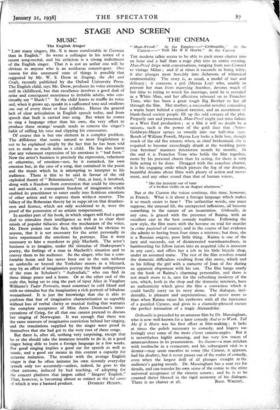STAGE AND SCREEN
MUSIC
The English singer
" LIKE many singers, Mr. X is more comfortable in German than in English." So wrote a colleague in his notice of a recent song-recital, and his criticism is a strong indictment of the English singer. That it is not an unfair one will be obvious to anyone who is an assiduous concert-goer. One reason for this unnatural state of things is possibly that suggested by Mr. W. S. Drew in Singing, the Art and Craft, recently published by the Oxford University Press. The English child, says Mr. Drew, produces its voice extremely well in childhood, but that excellence involves a good deal of noise and consequent annoyance to irritable adults, who con- tinually say " Hush ! " So the child learns to muffle its voice and, when it grows up, speald in a suffocated tone and swallows one out of every three or four syllables. Hence the general lack of clear articulation in English speech today, and from speech that fault is carried into song. But when he comes to sing a language °tiler than his own, the very effort to produce these strange sounds tends to remove the singer's habit of stifling his tone and clipping his consonants.
Of course this is but one element in a complex problem. The diffidence that seems natural to most Englishmen is not to be explained simply by the fact that he has been told not to make so much noise as a child. He has also learnt that any vehement expression of his emotions is " bad form." Now the artist's business is precisely the expression, vehement or otherwise, of emotion—not, be it remarked, his own emotion but, in the case of a song, that contained in the poem and the music which he is attempting to interpret to his audience. There is this to be said in favour of the old exploded theory of " Bohexnianism," that, at least, it involved, along with a freedom from convention that could be tiresome and anti-social, a consequent freedom of imagination which enabled its practitioner to enter easily into fictitious emotions of other artists and to express them witho it reserve. The fallacy of the Bohemian theory lay in suppcsition that drunken- ness and licence, which are only accidental to it, were the proof of the possession of an artistic temperament.
In another part of his book, in which singers will find a great deal to stimulate their intelligence as well as to clear their minds of popular fallacies about the mechanism of the voice, Mr. Drew points -out the fact, which should be obvious to anyone, that it is not necessary for the artist personally to have experienced the emotions he portrays. Else it were necessary to hire a murderer to Play' 'Macbeth. The actor's business is to imagine, under the stimplus of Shakespeare's poetry, the feelings of a man in Macbeth's situation and to convey them to his audience. So the singer, who has a com- fortable home and has never been out in the rain without an umbrella or braved the Yorkshire moors in a blizzard, may by an effort of imagination portray the bleak unhappiness of the man in Schubert's " Aufenthalt," who can find in these things peace and a home. Or at the other end of the scale she, being set to sing the part of tipsy Alice in Vaughan Williams's Tudor Portraits, must construct in cold blood and with no stimulus but the imagination a rich portrait of bibulous womanhood. It is just the knowledge that she is able to perform • that feat of imaginative characterisation so superbly Without loss of verbal clarity or musical feeling that warrants the complete acceptance of Miss Astra Desmond's inter- pretations of Grieg, for all that one cannot pretend to discuss her singing of Norwegian. It was enough that there was the same measure of imaginative conviction behind her singing, and the translations supplied by the singer were proof in themselves that she had got to the very root of these songs.
But there is, after all, nothing very surprising, except that he or she should take the immense trouble to do it, in a good singer being able to learn a foreign language in a few weeks. For good singing implies a good ear for speech as well as music, and a good ear means in this context a capacity for accurate imitation. The trouble with the average English singer is that he often imitates his own slovenly every-day speech only too accurately—unless, indeed, he goes to the other extreme, induced by bad teaching, of adopting for the concert platform that jargon called " Singers' English." That, however, is becoming almost as extinct as the bel canto of which it was If bastard product. DYNELEY Hussies.














































 Previous page
Previous page